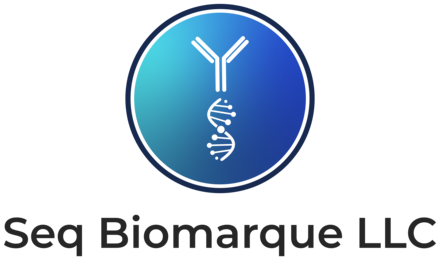
Our Story

Our Story
Seq Biomarque is led by an experienced team of scientists who bring extensive knowledge and expertise in developing and applying biomarkers to the diagnosis of treatment of disease. The team includes key leaders in diagnostics, neurological diseases, and drug development.
The company’s vision is to apply translational and clinical biomarker knowledge to precision neuroscience.
Seq Biomarque: Cost-effective, easily accessible, and highly sensitive, blood-based, multi-factor Alzheimer’s Diagnostic Test.

Seq Biomarque is Addressing an Unmet Need in Alzheimer’s
Alzheimer’s disease is the number one cause of dementia. In the US, approximately 6.7 million people are affected, and the prevalence worldwide is estimated to be as high as 24 million.
Currently, the diagnosis of AD involves Cognitive clinical assessments and the use of expensive neuroimaging tests (MRI, CT or PET brain imaging) or invasive (spinal fluid) testing.
Less invasive and more readily available biomarker tests will be essential to identify where individuals are in the AD continuum and who will receive treatments. Seq Biomarque is developing a multi-factor biomarker test that is less invasive, highly sensitive, highly specific, and capable of being performed in a primary care setting.
Seq Biomarque: Precision Neuroscience & Biomarker Testing
Multifactor Alzheimer’s Biomarker Panel
Why Alzheimer’s? An Unmet Need for New Biomarkers

Alzheimer’s Diagnosis
- Alzheimer’s disease is a brain disorder that slowly disrupts memory, cognitive thinking, and, eventually, the ability to carry out the simplest tasks, yet there is no single test for dementia due to Alzheimer’s disease.
- Physicians use a variety of approaches to aid in the diagnosis of AD, including, cognitive assessments, neurologic examinations, and brain imaging scans.
- However, AD can go undiagnosed for several years. The average length between when symptoms begin and when an AD diagnosis is made is 2.8 years.
Alzheimer’s Disease Continuum
The Alzheimer’s disease continuum consists of three phases: preclinical, mild cognitive impairment (MCI), and dementia.
Changes in the brain may begin a decade or more before symptoms appear (Preclinical Alzheimer’s Disease).
Alzheimer’s disease most commonly affects older adults.
Alzheimer’s disease can also affect people in their 30s or 40s. When Alzheimer’s disease occurs under age 65, it is known as early-onset Alzheimer’s disease.

Seq Biomarque’s is Targeting the Alzheimer’s Disease Continuum

Biomarker tests will be essential to identify where individuals are in the AD continuum and who will receive disease-modifying therapies. (AD Therapies: ex. Aducanumab).
Biomarkers will also be critical for monitoring treatment effects (Clinical Trials).
Biomarker tests already play an important role in drug development because they enable researchers to recruit into clinical trials only those individuals with specific types or stages of Alzheimer’s disease.
A blood-based diagnostic will make testing more readily available (Primary Care Setting), ultimately improving diagnosis timelines and reducing overall medical costs.
Seq Biomarque is developing new biomarker tests across the AD Continuum
How does Alzheimer’s Disease Affect the Brain?
Healthy neurons stop functioning, lose connections with other neurons, and die.
During this very early stage of Alzheimer’s, toxic changes are taking place in the brain, including the abnormal buildup of proteins (amyloid plaques and tau tangles).
Alzheimer’s Disease-related changes in the brain may begin a decade or more before symptoms appear.

Brain Changes Associated with Alzheimer’s
- A healthy adult brain has about 100 billion neurons. Neurons in the brain create the cellular basis of memories, thoughts, sensations, emotions, and movements.
- During Alzheimer’s Disease progression, the abnormal accumulation of protein fragments, such as beta-amyloid and Tau, may disrupt normal neuron-to-neuron signaling and may ultimately lead to neuron (cell) death.
- Several other abnormal proteins and brain changes may also contribute to the development of Alzheimer’s disease (inflammation and atrophy).
- Diagnostic Opportunity: Remains of neuronal cell death (abnormal proteins) may enter the bloodstream and these abnormal proteins can be identified by highly specific blood-based biomarker tests. These blood-based biomarker tests may ultimately provide insight into changes that are occurring in the brains of individuals with Alzheimer’s.



Stay Connected: